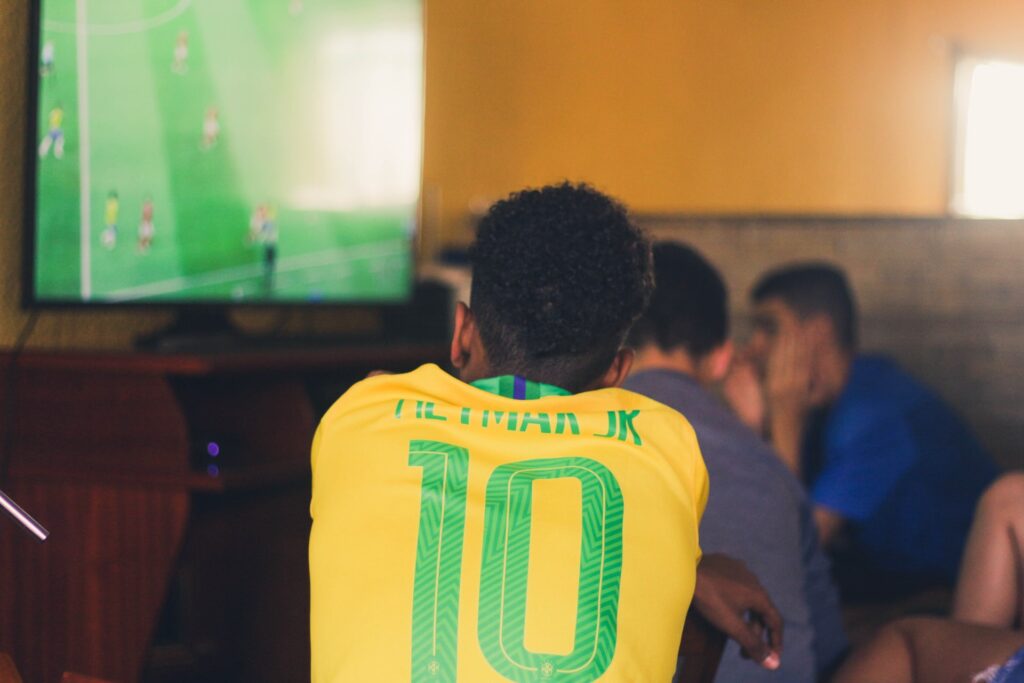Table of Contents
- So, what is the World Cup third-placed playoff match?
- Why is there a third-placed match in the World Cup?
- History of the third-placed game in the World Cup
- Do you get anything for finishing third in the World Cup?
- Are there any other playoff games in the World Cup finals?
- Recap: The third-placed playoff at the World Cup
The third-place playoff: a curious game that some love because it seems to throw up goals aplenty; others question its very existence.
Some sports don’t even entertain the idea of a third-place playoff because it’s deemed by many as pointless.
So what is a third-place playoff? How do you qualify for this game?
We’ll take a look at what it is, why it exists, and its history in soccer.
So, what is the World Cup third-placed playoff match?
The World Cup third-placed playoff is a game to determine who finishes third in a tournament and who finishes fourth. Other sports or competitions might call it a bronze medal match. The game is contested by the two losing semi-finalists.
The logic behind the game is similar to the Olympics, where the collection of medals is viewed as an achievement.
Although few sides who reach the semi-final and don’t win the tournament will be happy, it’s one last chance for players to showcase their skills on the world stage and give fans some solace following the semi-final heartbreak.
Why is there a third-placed match in the World Cup?
Third-place playoff games are considered pointless by critics, suggesting that the mere idea of them risks injuring players in a game they shouldn’t be playing in, and charging fans more money needlessly.
Former England striker Alan Shearer claimed that players essentially just want to go home and recover next to their loved ones after a semi-final loss.
Similarly to the Olympics, though, the World Cup likes to credit the third-placed team for getting so far in a tournament.
It’s viewed as a consolation game for participants to gain some credibility back after their semi-final loss and give fans one last chance to cheer on their heroes.
At the World Cup, most neutrals don’t mind the third-place playoff because it’s simply an extra game of soccer to watch.
For the players, the third-place playoff serves as an opportunity to add to their goals, assists, or clean sheet tallies. This way, they will feature in the same amount of games as teams who qualify for the final.
Therefore, some players could be more motivated for the third-place playoff than others who have less chance of obtaining a personal accolade, offering interesting individual dynamics to the team game.
History of the third-placed game in the World Cup

The tale of this fixture goes all the way back to 1934. On that occasion, Germany beat Austria 3-2 to claim third place at the World Cup in Italy.
The very first tournament in Uruguay four years earlier didn’t have a third-place playoff. This, and the 1950 edition, were the only World Cups not to feature a third-place playoff.
Perennial semi-finalists Germany, who are also frequent outright winners, have finished in third place four times, more than any other nation.
The game has historically been a high-scoring affair, where there might be more freedom for players who aren’t jeopardizing their side’s place in the next round if they take a risk.
Over the years, we’ve seen coaches rotate their squads to use many of the players that have thus far been unpicked throughout the tournament. It can be a huge personal achievement for somebody to just feature in the World Cup, so it serves as a great opportunity for them to want to play well.
Reportedly, tickets for the third-place playoff were being sold second-hand for over $1,000 at the 2018 World Cup in Russia.
Do you get anything for finishing third in the World Cup?
Players and coaching staff all get a bronze medal if they finish third in a World Cup. The further you get in a World Cup, the more prize money that the soccer association receives. If you win the third-place playoff, you’ll receive almost $28 million, compared to roughly $25.5 million for the fourth-placed side.
Generally, the prize money is divided between players and coaching staff, used as motivation for them to progress further through the tournament.
However, despite this potential windfall, many players donate their international earnings to charity these days, as England’s team has been doing for the past 15 years. It’s no secret that these stars earn mega bucks for their clubs, so the earnings from a third-place playoff win might not be a huge sum to them in the bigger picture.
One of the ideas behind it is that the game offers the chance of consolation for a losing semi-finalist. Therefore, players can give the fans one last thing to cheer to round off the tournament in a positive manner.
The third placed team also gets their name in the history books. This idea is often ridiculed by critics who suggest that nobody remembers who finished third. While this is true a lot of the time, if a side punches above their weight and finishing third in a tournament nobody was expecting them to win any games in, this is a huge recognition for their extraordinary efforts.
Are there any other playoff games in the World Cup finals?
In the World Cup, the initial format is a “round robin” group stage, where each side plays every other team in its group.
Subsequently, the format turns into what is called the knockout stage. The top two teams from each group qualify for the first knockout round.
This is essentially a playoff format; teams go head-to-head with one another looking to progress to the next round.
The number of teams halves in each knockout round until the winner is decided in the final.
No team receives a bye for better group-stage performances. Instead, topping your group means you get to play against sides that finish second in another group. This format is similar to seeding in American sports.
The knockout games are very much like the playoff games fans of American sports have: the winner moves on, loser goes home.
Once you know your final group position, your path is predetermined so you know who you can and can’t face at any stage until you potentially reach the final. Which side of the fixture list your team finds itself on can depend on whether you finish first or second in your group.
This differs slightly from the NFL, for example, where every AFC team knows they’ll only face another AFC team in the playoffs.
The World Cup format adds an interesting dynamic to how teams approach the group stage, however. Some fans won’t mind finishing second in a group rather than first because it’ll put them on the perceived more favorable side of the draw.
Professional players will never say that they want to finish second in a group but it makes you wonder if they consider it at all.
Recap: The third-placed playoff at the World Cup
The third-place playoff isn’t a game unique to soccer but it’s woven its way into the fabric of our sport’s greatest event.
Ultimately, who finishes third might not live too long in the memory of serial winners, but for a side daring to dream, a third-place finish could be the achievement of a lifetime.
Fascinated by the action in Qatar 2022? Learn about whether the winning team keeps the World Cup trophy and how a host nation is selected by FIFA.


Why not give the prize of automatic qualification for the next WC finals for the winner of the third place play off? It would give more motivation to win. This would also mean automatic qualification for both finalists. Hence automatic qualifiers for next WC finals would be 1. Host country/countries 2. Winner 3. runner up and 4. Winner of the TPPO
Love this! Such a good idea. It would certainly make sense to incentivize the TPPO as it seems a little like a dead rubber fixture. FIFA is currently planning to reshape the WC ahead of the US/Mexico/Canada tournament, so it will be interesting to see what they have in mind for the TPPO… Ross.